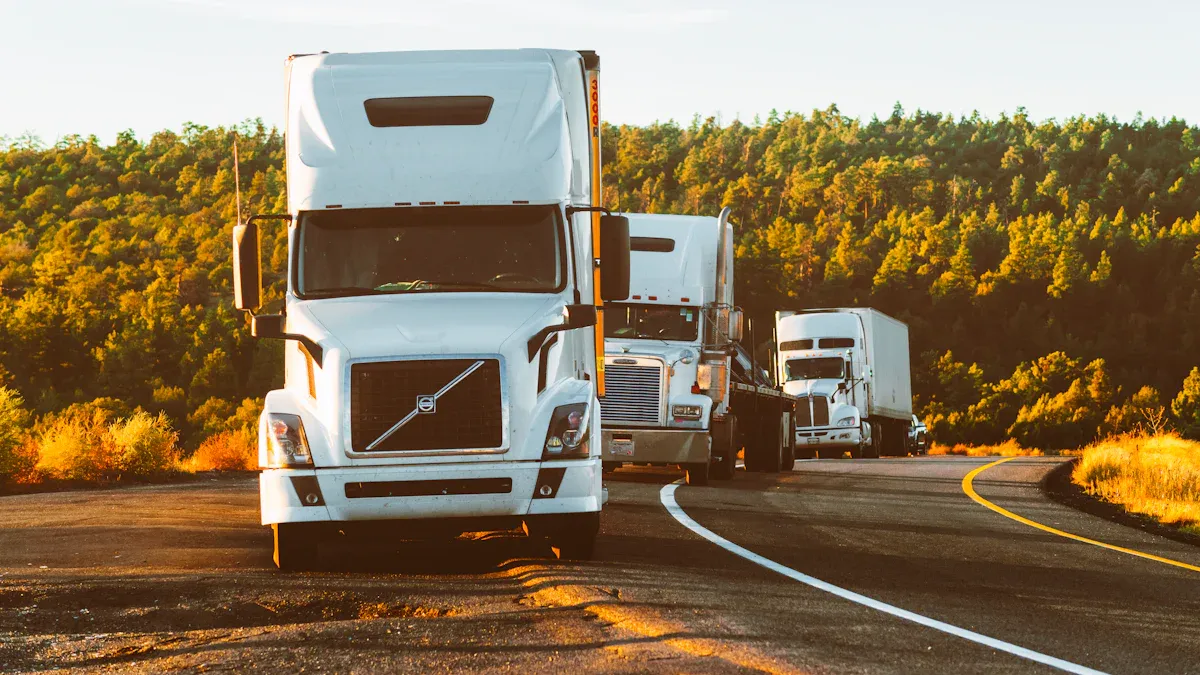
You face real risks every time your fleet hits the road. Speeding contributes to nearly 30% of all fatal road crashes, and large trucks play a part in over one-fifth of these. When you use a speed limiter, you help reduce these dangers. For example:
- In a New York City pilot, vehicles with speed control technology saw a 60% drop in speeding incidents.
- Almost 11,000 fatal crashes in 2022 linked back to speeding.
By taking action now, you protect your drivers, lower costs, and keep your business compliant.
Key Takeaways
- Speed limiters help stop crashes. They keep drivers safe. They lower the chance of bad injuries.
- Speed limiters help fleets save money. They use less fuel. They cost less to fix. They may give insurance discounts.
- Speed limiters make rules easier to follow. They help you obey laws. They help you avoid fines.
- Speed limiters help take care of vehicles. They cause less damage. Trucks stay on the road longer.
- Smart speed limiters make driving safer. GPS helps drivers follow speed limits. GPS helps drivers avoid crashes.
Why Speed Limiters Matter

Safety Impact
You want your drivers to get home safe every day. Speed limiters help lower the chance of crashes and injuries. Trucks with speed limiters crash less than trucks without them. The table below shows what different studies found:
| Study Source | Findings |
|---|---|
| USDOT | Trucks with speed limiters had half as many crashes as those without. |
| Congressional Research Service | Between 63 and 214 lives saved, and 70 to 236 serious injuries prevented each year. |
| Ontario Ministry of Transportation | After using speed limiters, there was a 73% drop in crashes caused by speeding in large CMVs. |
Driving slower means crashes are not as bad. You also help keep other people on the road safe. Experts say speed is a big reason for truck crashes. Using a speed limiter makes roads safer for everyone.
Cost Reduction
Speed limiters can help you save money. When you control speed, you use less fuel and brake less hard. This means your vehicles last longer. Here are some ways speed limiters save you money:
- Fewer times drivers speed, so fewer tickets.
- Less hard braking, so you pay less for repairs.
- Fewer big crashes, which saves you a lot of money.
One study showed that cutting big crashes by 40% could save a fleet over £300,000 each year. Fuel is easier to manage, and you see real savings.
Compliance
You have to follow rules from the government. Many places now make speed limiters a must for some vehicles. The table below shows some important rules:
| Market | Requirement | Speed Limit |
|---|---|---|
| Singapore | Lorries weighing 3,501 kg to 12,000 kg must have speed limiters installed. | 60 km/h |
In the United States, groups like NHTSA and FMCSA want speed rules for commercial fleets. Using a speed limiter helps you follow these rules and avoid fines. It also shows you care about safety and doing the right thing.
How Speed Limiters Work

Basic Function
Speed limiters help control how fast your fleet vehicles go. When a vehicle gets to its set speed, the system stops it from going faster. Here is what happens:
- The speed limiter blocks signals from the gas pedal when the vehicle reaches the set speed.
- If your vehicle has cruise control, the system adds extra parts so you cannot go over the limit.
- Some systems use electronic or mechanical parts to change how much fuel or air goes to the engine.
- When the vehicle hits the top speed, the limiter stops more fuel or air from getting to the engine.
Tip: Limiting speed helps drivers avoid risky choices and keeps your fleet safer.
Technology Types
You can pick from different speed limiter types for your fleet. Each type works in its own way and has special benefits. The table below shows the main types and how they work:
| Type of Speed Limiter | Description |
|---|---|
| Drive by Wire Speed Limiter (DBW) | Connects to the vehicle’s electronic throttle for precise speed control. |
| Geo-Kontrol Speed Limiter | Uses GPS to match speed with local limits, stopping speeding in different zones. |
| Road Speed Limiter System 80 | A mechanical device that caps speed at 80 km/h by controlling fuel supply, simple and cost-effective. |
| Reversing Speed Limiter | Sets a safe top speed for reversing, which you can adjust for different vehicles or equipment. |
Newer systems use smart technology to help you control speed better. For example, Intelligent Speed Assistance (ISA) uses GPS and digital maps to stop drivers from speeding. Some systems only warn drivers when they go too fast. Others actually stop the vehicle from speeding. You can also connect speed limiters with telematics. This lets you see speed, location, and driver habits right away. With these tools, you can find risky driving and fix problems before they get worse.
Speed Limiter Benefits
Accident Prevention
You want your drivers and trucks to be safe. Speed limiters help lower crash risks by keeping speeds down. When you use speed limiters, you see fewer crashes and less serious injuries. Many studies show fleets are safer with speed limiters.
| Vehicle Type | Crash Rate (per 100 trucks/year) | Reduction in Crash Rate |
|---|---|---|
| Without Speed Limiter | 16.4 | N/A |
| With Speed Limiter | 11 | 33.5% |
| Speed Limiter-Relevant Crashes (Without) | 5 | N/A |
| Speed Limiter-Relevant Crashes (With) | 1.4 | 72% |
Trucks with speed limiters crash less often. Cities around the world have seen big drops in accidents and deaths after using speed limiters:
- Lagos State, Nigeria: Accidents went down by half. Deaths dropped by 30%.
- Dhaka, Bangladesh: Accidents dropped by 40%. Deaths dropped by half.
- Nairobi, Kenya: Accidents dropped by 30%. Deaths dropped by half.
- Kigali, Rwanda: Accidents dropped by 60%. Deaths dropped by 70%.
Note: Fewer crashes mean less time fixing trucks, fewer injuries, and lower costs for your company.
Fuel Efficiency
Fuel costs a lot of money. Speed limiters help you save by stopping trucks from going too fast. Most trucking fleets use speed limiters to control fuel use. When drivers keep a steady speed, trucks use less fuel and make less pollution.
- Speed limiters help drivers keep a steady speed, saving fuel.
- You can save millions of gallons of fuel every year.
- The trucking industry could save $1.1 billion each year by using speed limiters.
Carriers in Canada have saved up to $250 million a year with speed limiters. You also help the planet by cutting greenhouse gases by 0.6 megatonnes each year.
Maintenance Savings
Driving at safe speeds means you spend less on repairs. Speed limiters cut down on hard stops and quick braking, so tires and brakes last longer. Fewer crashes mean trucks spend less time getting fixed.
- Speed limiters lower crashes, so trucks are on the road more.
- You pay less for repairs because trucks last longer.
- You can plan better routes and save fuel, which lowers costs.
| Impact Area | Description |
|---|---|
| Fuel Economy | Speed limiters help trucks use less fuel by stopping speeding. |
| Tire Wear | Lower speeds help tires last longer, saving money. |
| Insurance Premiums | Insurance companies may give discounts for using speed limiters. |
| Carbon Footprint | Trucks use less fuel and make less pollution. |
| Overall TCO | You spend less on repairs and engine wear, lowering total costs. |
Tip: Insurance companies think speed limiters are a smart safety choice. You might get lower insurance bills, which saves even more money.
You can check your progress by looking at things like speeding tickets. Try to have fewer than 5 speeding tickets for every 100,000 miles. Use speed limiters, reward safe drivers, and watch your data to keep your fleet working well.
Addressing Concerns
Drawbacks
You might worry about using speed limiters in your fleet. Some common problems are:
| Concern | Description |
|---|---|
| Difficulty in overtaking | Speed limiters can make passing other cars hard for trucks. This can cause long lines. |
| Disruption to traffic flow | Trucks may go slower than other cars. This can lead to traffic jams and delays. |
| Slower delivery times | Speed limiters can make trips longer and change delivery times. |
Drivers sometimes feel more tired because they spend more time driving. They may feel stressed when they cannot keep up with other cars. This can make driving risky.
You might also worry about the cost. Many old trucks do not have the right technology. You may need to pay for upgrades or new trucks. This can be expensive for your business.
Note: Many people think trucks pass cars a lot, but studies show this is rare. On a 1,000-mile trip, only about 30 trucks pass a car at 71.5 mph. Driving a little faster saves less time than you think—about 13 minutes on a long trip.
Solutions
You can fix these problems with smart planning and good tools:
- Train drivers to use safe speeds and good habits.
- Make schedules that give drivers enough rest and help them avoid getting tired.
- Keep trucks working well with regular checks and repairs.
- Talk openly with drivers so they feel listened to and supported.
- Use scorecards to track speeding and reward safe driving.
- Plan routes with geozones to avoid busy roads and traffic jams.
- Make sure speed limiter technology works with your trucks. Technical changes can help it fit better.
- Teach your team about the real benefits of speed limiters. This can help them trust the system and not resist it.
Tip: Many fleets see crash rates drop by about 50% with speed limiters. The cost of adding speed limiters is often less than the money saved from fewer crashes and repairs.
You can solve most problems with the right steps. By focusing on safety, training, and talking with your team, you help your fleet work well and stay safe.
You keep your fleet safe by using a speed limiter. This tool helps lower crash risks. It also saves money and helps you follow safety rules.
- Trucking companies use speed limiters to follow strict rules and save fuel.
- More online shopping means more fleets use speed limiters for safer roads.
| Key Improvement | Description |
|---|---|
| Better Compliance | Speed limiters help you follow safety rules. |
| Advanced Technology | GPS and telematics make speed limiters smarter. |
| Lower Costs | You spend less on fuel and repairs. |
You can check your fleet rules or talk to a fleet expert. New tools help keep drivers safe and make your business better.
FAQ
What is a speed limiter?
A speed limiter is a device that sets a top speed for your vehicle. When your truck reaches this speed, the limiter stops it from going faster. You help keep your drivers safe and follow the law.
Can drivers turn off speed limiters?
No, drivers cannot turn off speed limiters. The system locks the set speed. Only authorized technicians can change or remove the limiter. This keeps your fleet safe and compliant.
Do speed limiters affect fuel economy?
Yes, speed limiters help you save fuel. By keeping a steady speed, your trucks use less fuel. You spend less money on gas and help the environment.
Will speed limiters slow down deliveries?
- Speed limiters may add a few minutes to each trip.
- You can plan routes and schedules to avoid delays.
- Most fleets find the safety and cost benefits outweigh small changes in delivery time.
